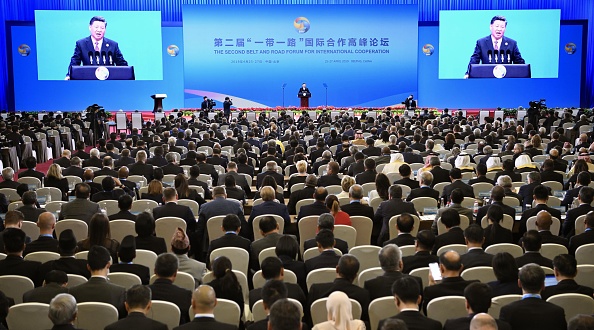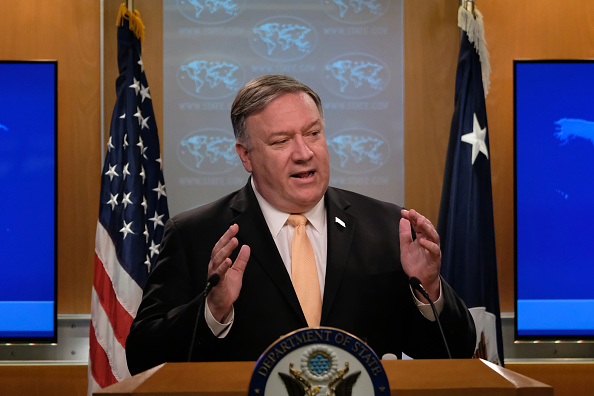
 The Great Turbine Caper?
The Great Turbine Caper?The United States has charged a former engineer for General Electric (GE) and a Chinese businessman with economic espionage and conspiracy to steal trade secrets. The pair allegedly stole secrets on turbine technology from GE with "financial and other support" from China. The U.S. Justice Department alleges that the pair sold the secrets to Chinese companies, and that the theft benefitted Chinese government-sponsored research institutes.
Set against the backdrop of a major trade war between the two countries, the Trump administration has been doggedly pursuing a crackdown on alleged Chinese stealing of corporate secrets, intellectual property theft, and any actions that may prevent U.S. companies from doing business in China.
Beijing swiftly rejected the accusation of government involvement, as well as the broader allegation of technology theft from U.S. businesses. The Foreign Ministry issued a statement saying that "the achievements of China's development have not come from theft. It is the result of the Chinese people's wisdom and sweat."
 Greening of the New Silk Road
Greening of the New Silk RoadChina's Belt and Road Initiative (BRI) was the center of talks between world leaders in Beijing this week, where discussions centered on the sustainability of the project, as well as the funding mechanisms. Thirty seven world leaders are expected to sign a communique that will respect global debt goals and promote green growth.
The agreement is set to allay fears that the project will saddle poor countries with unmanageable debt, and wreak environmental havoc in the process. Malaysia, Sierra Leone, and Pakistan have all recently scaled down or canceled BRI projects out of concern for the high costs.
The BRI is Xi Jinping's signature policy, and is poised to connect China with the rest of Asia and Europe through massive infrastructure development. As the project grows in scale and ambition, Peru has joined a short list of Latin American nations that have signed on, despite objections and pressure from the United States not to.
 Crude Diplomacy
Crude DiplomacyBeijing is objecting to Washington's "long-arm" diplomacy as the United States announced this week new attempts to pressure countries to stop buying Iranian oil in order to drive down Tehran's export levels. The U.S. is now attempting to stop all nations, including trade partners India, Japan, South Korea and Turkey, from buying crude oil from Iran or face sanctions. Beijing, however, claims that its dealings with Iran are "reasonable and legitimate." This comes as an about-face from the Obama administration's policy of sanctions relief in exchange for a brake on Iran's nuclear program.
As part of the U.S. withdrawal from the Iran Nuclear Deal, Washington is working to isolate Tehran economically and undercut its power in the region. But Beijing, which imports about half of Iranian oil exports, will raise a huge diplomatic challenge to the clampdown effort. China, as well as Turkey, is expected to face the biggest struggle in reducing their Iranian oil supplies, but analysts say Beijing is still unlikely to bring Iranian oil imports to a halt.
Secretary of State Mike Pompeo announced that all sanction waivers will expire on May 2, paving the way for America to tighten sanctions. Iranian oil sales are currently Tehran's biggest lifeline, bringing in 40% of government revenue.
Prepared by China-US Focus editorial teams in Hong Kong and New York, this weekly newsletter offers you snap shots of latest trends and developments emerging from China every week, while adding a dose of historical perspective.
- 2019-04-19 Sowing Seeds of Tension
- 2019-04-12 Slow or Steady?
- 2019-04-05 The Last Mile is The Hardest
- 2019-03-29 From Negotiation to (Smart) Competition
- 2019-03-23 Xi Hits the Road
- 2019-03-16 Proceeding With Caution
- 2019-03-08 Reading the Tea Leaves
- 2019-03-01 The Art of No Deal
- 2019-02-23 The Devil is in the Details
- 2019-02-16 Trade Talks, Round 3: Waiting for Trump-Xi?
- 2019-02-08 Welcoming the Pig
- 2019-02-02 The Final Countdown: One Month Until Trade Talks Deadline
- 2019-01-26 How Slow Will it Go?
- 2019-01-18 Countdown to Trump-Kim: Round Two
- 2019-01-11 Kim Jong-un Visits Beijing
- 2019-01-04 Cross-strait tensions mount on anniversary
- 2018-12-21 Xi’s 40th Anniversary Speech
- 2018-12-14 Post-G20 Detentions & Tech Tensions
- 2018-11-30 Trump and Xi Set to Face Off at the G20
